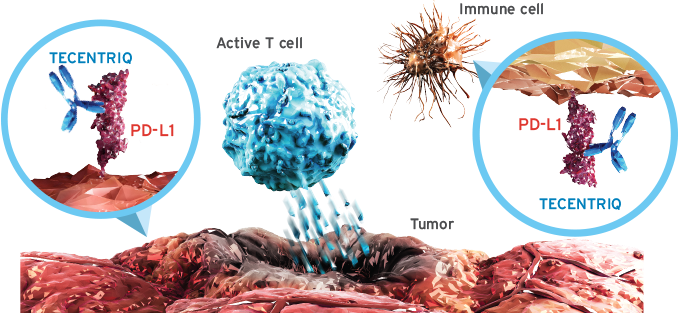
Roche’s anti-PD-L1 fails in bladder cancer
Fiasco in Phase III: Roche's conditionally approved PD-L1 checkpoint inhibitor did not meet the endpoint of overall survival vs chemotherapy in a confirmatory study with pre-treated patients with metastatic urothelial cancer.
In May 2016, the FDA granted Roche accelerated approval for Tecentriq (atezolizumab) for the treatment of people with locally advanced or metastatic urothelial carcinoma (mUC) unsuccessfully pre-treated with platinum-based chemotherapy before or after surgery. The conditional approval based on the results of the open-label Phase II IMvigor210 study was subject to confirmation by the randomised Phase III IMvigor211 study which now failed to meet the patient-relevant endpoint of overall survival (OS) compared to chemotherapy. According to Roche, the safety profile observed in the study was consistent with what has been previously observed for the anti-PD-L1 antibody.
Strategically, the failure is a disaster for the Basel-based pharma giant, who planned to position its cancer immunotherapy lead as stand-alone immunotherapeutic in the difficult-to-treat condition urothelial carcinoma, which accounts for 90% of all bladder cancers. Roche tried to compensate its late start in the highly crowded field of checkpoint inhibitor therapies in the lucrative field of lung cancer.
Chief Medical Officer Sandra Horning, Head of Global Product Development, said: While these results are not what we had expected, we believe that Tecentriq will continue to play an important role in the treatment of people with advanced bladder cancer. Roche announced that it will further examine the IMvigor211 data to better understand the results. Pointing to presentation of detailed data presentation later this year, the company said that the chemotherapy arm results were better than assumed when doing the study design.
Conditional approval had been granted on the base of good objective response rates and an acceptable safety profile. Another study, IMvigor130, is currently ongoing in a patient population with locally advanced or mUC not eligible for cisplatin chemotherapy to position Tecentriq as first-line therapy in this group.
In the IMvigor211 study 931 patients people with previously-treated mUC who progressed during or following a platinum-based regimen received the anti-PD-L1 and vinflunine, paclitaxel or docetaxel chemotherapy every three weeks. In the first patient population to be tested, with high PD-L1 expression, the treatment failed to deliver significant survival benefit. Key secondary endpoints include objective response rate, progression-free survival, duration of response and safety.


 ©FabienMalot
©FabienMalot Lonza Group
Lonza Group Vetter Pharma
Vetter Pharma